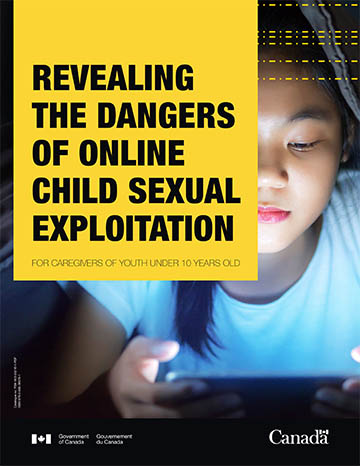Booklet for parents and caregivers of kids under 10 years old
Revealing The Dangers Of Online Child Sexual Exploitation
(For Caregivers Of Youth Under 10 Years Old)
Online child sexual exploitation: what you need to know
Children are spending more time online than ever before. It’s where they go to play, learn, socialize and be entertained. As your child gets older and spends more unsupervised time online, it can open the door to harmful situations.
There have always been people who prey on children — the difference is the internet allows them to do it anonymously and from a distance. It’s a growing problem across Canada. Parents need to be aware of how to protect children from online child sexual exploitation and teach them how to stay safe.
Risks you should be aware of
Sexual images and videos
Children can easily be exposed to graphic and potentially harmful sexual content while watching videos, visiting websites, conducting searches or playing games online. If they do, they should know that pornography does not depict healthy relationships and it is normal to feel uncomfortable seeing it.
Grooming
Grooming is when someone builds trust with a child, and sometimes the adults around them, to gain access to and control the child. It can be a stranger or someone your child knows. They normalize sexual behaviours by showing the child sexual images or videos, and sexualize the relationship by talking about sex or asking for images or videos. They may threaten or pressure your child into doing what they ask, or even to meet in person.
Sexting
Sexting is when someone creates, sends or shares sexual messages, images or videos with friends, people they know or even strangers online. Older kids may think it is harmless, especially with someone they know or like, but once an image is sent it is out of their control and it can end up hurting them or someone else.
Sextortion
Sextortion is a type of blackmail where someone threatens to send a sexual image or video of your child to friends, family or other people if your child doesn’t provide more sexual content, pay them or do what they ask. The perpetrator can be a stranger or someone your child knows.
Capping
Capping is when someone, typically an adult, records or screenshots boys and girls they target on various video streaming platforms or applications getting naked — often without the victim knowing they are recording the video chat. Offenders often use video clips and specialized software to make children think they are interacting with someone close to the child’s own age, and trick them into doing what they ask on camera. They may share this video with others, or use it to sextort their victim.
What you can do
Talk openly and honestly with your child
It’s the best way to reduce the risks for your child. Here are some tips:
- Start having real conversations with them from an early age
- Make these talks part of daily routines like meals or bedtime
- Let them know you are available to talk any time
- Ask open-ended questions and really listen to their answers
- Take an interest in things they like — including what they do online
- Show them how to have a conversation — share your own thoughts and feelings
Remember that the signs of online sexual exploitation are not exclusive to specific acts. The tactics offenders use can be interchangeable across different situations, and different types of exploitation can lead to others.
Some topics you may want to talk about include:
- Keeping personal information like your location, schedule or contact information private
- Not trusting everything they read, see or watch online
- That some people including adults are not safe to be around
- The risks of sharing pictures or videos of themselves
- Not accepting gifts or meeting people without talking to you first
- Not to do things when asked by people they’ve just met — especially strangers
- That they can always say no and stop talking to someone online for any reason
- That it’s always okay to come to you or another safe adult — they won’t be in trouble
- That, even if they don’t want to talk, you are there for them if they need you
Be aware and involved
- Supervise younger children when they are online
- Be involved or take an interest in what your child is doing online
- Know who they are interacting with online
- Set up parental controls, use filtering software and set limits on your child’s use of devices
- Discourage use or playing of games, apps, music and videos with age recommendations older than your child
- Encourage strong passwords and use of privacy settings where appropriate
- Look for changes in mood, online habits, social behaviour, eating or sleeping habits or use of sexual language that may indicate someone has or is trying to take advantage of them
Additional resources for caregivers
- Local police
If you know about a child who is in immediate danger or risk, call 911 or your local police - Cybertip.ca
Canada's online tip line for reporting online sexual exploitation of children - KidsHelpPhone.ca
Contact Kids Help Phone by calling 1-800-668-6868 or texting 686868 - NeedHelpNow.ca
Help with removing sexual pictures or videos of your child from the internet
Learn more about Online Dangers
Page details
- Date modified:
